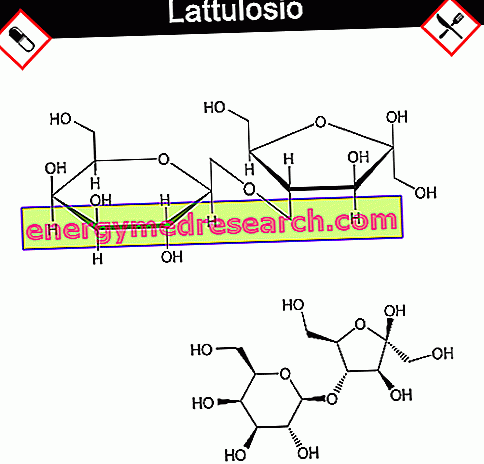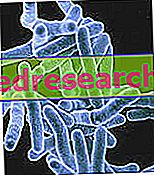Generality
Lactulose is a semi-synthetic disaccharide, obtained from the association of D-galactose and D-lactose sugars.

The particular chemical bond present between its two constituent sugars, gives the lactulose a natural resistance to the hydrolytic action of digestive enzymes, allowing it to reach the intestinal environment unchanged.
This characteristic constitutes the prerogative of the biological activity of lactulose. In fact, once unchanged the colic environment, lactulose can perform its functions;
- mechanical, useful in the treatment of constipation;
- prebiotic type metabolic, thanks to the fermentation processes supported by Lactobacilli and Bifidobacteria.
Indications
Why is lactulose used? What is it for?
In the supplementary field, lactulose is mainly used for its laxative and prebiotic action.
In the pharmacological field, on the other hand, lactulose detoxifies properties against nitrogenous products, which are particularly valuable during encephalopathies.
Recent studies would also attribute to lactulose:
- Beneficial activities against intestinal inflammatory diseases;
- Beneficial activities against osteoporosis;
- Protective activities for diabetes and kidney failure;
- Antiseptic activities for the intestinal mucosa;
- Hypoglycemic and hypolipidemic metabolic activities.
Property and Effectiveness
What benefit has lactulose shown during the studies?
There are numerous studies and clinical evidences related to the usefulness of lactulose.
Lactulose and laxative activity
The laxative activity of lactulose is well characterized from the clinical point of view, which proved to be effective even in the case of chronic constipation.
This activity could be traced back to the osmotic effect of lactulose, capable of attracting water in the intestinal lumen, softening the feces and stimulating peristalsis.
The safe use of lactulose is such as to allow its use also as a remedy in children and in geriatric patients.
Lactulose and intestinal health
Once the undigested intestinal environment is reached, the lactulose undergoes processes of metabolization by the resident bacterial flora.
The metabolic action of the bacterial flora on lactulose determines the production of short chain fatty acids, including butyrate, to which they are attributed:
- Protective properties against colocites and more generally of intestinal mucosa;
- Antibacterial activity, very effective for example in counteracting the nesting and growth of Salmonella, Clostridium perfringens and E. Coli;
- Prebiotic activities;
- Antitumor activity, and prevention of recurrences.
Lactulose and metabolic activities
Through mechanisms that are not yet fully known, but which would probably still bring short-chain fatty acids into play, lactulose would seem to inhibit the hepatic synthesis of triglycerides and cholesterol, significantly improving the lipidemic profile in subjects suffering from metabolic syndrome
Lactulose and menopause
In a recent clinical trial, the use of lactulose has been shown to be effective, in menopausal women, in improving calcium absorption and in reducing the gradual age related bone loss.
This activity could be particularly valuable in preventing some pathological consequences associated with menopause, such as osteoporosis.
Lactulose and hepatic encephalopathy
The acidification of the colic content induced by lactulose would be beneficial also in the presence of hepatic encephalopathy, a neurological syndrome due to the accumulation in the circulation of toxic substances, such as ammonia.
Lactulose, by hindering the growth of ammonia-producing bacteria (such as. E coli ) in favor of lactobacilli, and acidifying the colic content, could be useful in the treatment of this disease.
In particular, the reduction of colic pH would on the one hand facilitate the conversion of ammonia (NH 3 ) into the much less absorbable ammonium ion (NH 4 +), while the increase in peristalsis would accelerate the elimination of the same species.
All this would result in the formation of a negative gradient in a colic environment, so that the ammonia present in the capillaries of the colonic mucosa would diffuse into the lumen, with a consequent reduction of the ammoniemia (concentration of the substance in the plasma).
Doses and method of use
How to use lactulose
The suggested lactulose doses vary considerably depending on the purpose.
For supplementary purposes, lactulose should be taken in concentrations of 2-5 g.
Higher doses, from 10 to 40 grams per day, could be used to combat constipation and constipation.
At these dosages, the frequency of side effects is clearly high.
Even higher dosages, therefore of strict medical and pharmacological relevance, could be used in the management of hepatic encephalopathy.
Side effects
Doses higher than 10 g per day could be associated with gastrointestinal disorders, such as diarrhea, flatulence, cramping abdominal pains and poorly formed stools.
Contraindications
When should lactulose not be used?
The use of lactulose is contraindicated in case of hypersensitivity to the active ingredient.
Due to the presence of galactose, in many products containing lactulose, the contraindications to use could also be extended to those requiring a low galactose diet.
Pharmacological Interactions
What drugs or foods can modify the effect of lactulose?
The potential beneficial effects of lactulose on intestinal health could be increased by the simultaneous intake of Bifidobacteria.
The use of lactulose could enhance the absorption of calcium and magnesium, taken both as supplements and through food.
Broad-spectrum antibacterial agents and antacids, administered orally at the same time as lactulose, may limit therapeutic efficacy.
Precautions for use
What do you need to know before taking lactulose?
The use of lactulose during pregnancy and in the subsequent period of breastfeeding should be carried out, if strictly necessary, under the supervision of your doctor.
Note the metabolic characteristics of lactulose, the use of supplements containing it should be done with particular caution in patients:
- with gastro-enteric disorders, such as swelling, diarrhea and flatulence;
- suffering from lactose intolerance;
- or directed towards endoscopic assessments of the intestinal tract.



